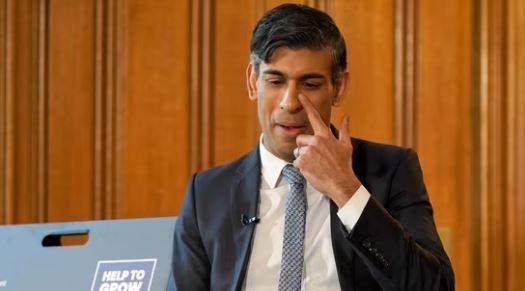The UK slipped into a mild recession in the second half of 2023, showing prime minister Rishi Sunak has so far failed to meet his pledge to grow the economy.
Gross domestic product fell 0.3% in the fourth quarter, more than the 0.1% drop economists forecast, Office for National Statistics figures released Thursday show. That followed an unrevised 0.1% decline in the previous three months, meeting economists’ technical definition of a recession, or two consecutive quarters of contraction.
While the economy still grew 0.1% across the year as a whole, it was the slowest annual expansion the UK had seen since 2009, excluding the first year of the pandemic. The UK economy last posted a quarter of growth in the first three months of last year.
UK bonds climbed for a second day, with 10-year yields coming off a two-month high close to 4.2% to fall below 4% for the first time in a week. Money markets boosted bets on the scope for monetary-policy easing this year, fully pricing three quarter-point cuts and a 10% chance of a fourth, while the first reduction is expected by August.
The pound slipped as much as 0.2% against the dollar at $1.2542, set for a third day of losses.
The recession, though widely anticipated, is further evidence that the Bank of England’s campaign to bring down inflation had taken its toll. The figures come at a particularly bad time for Sunak, with voters going to the polls in two parliamentary constituencies in England — the latest test of the opposition Labour Party’s strength ahead of a general election expected later this year.
Sunak made growing the economy one of five key pledges after taking office in October 2022, along with cutting debt, halving inflation, reducing health services waiting lists and stopping boat migration across the English Channel. So far, he can only claim victory on his pledge to slow down price growth, something that the bank has far more influence over than the government.
“The news that the UK slipped into technical recession in 2023 will be a blow for the prime minister on a day when he faces the prospect of losing two by-elections,” said Ruth Gregory, deputy chief UK economist at Capital Economics. “But this recession is as mild as they come and timely indicators suggest it is already nearing an end.”
The milestone could nonetheless increase pressure on the bank to move more quickly toward rate cuts, which investors currently expect to begin by August. BOE Governor Andrew Bailey played down the significance of a technical recession this week, pointing to signs of an “upturn” in surveys covering the start of 2024, although the bank had also expected the economy to avoid contraction in the fourth quarter.





